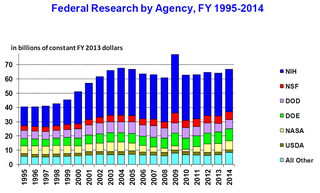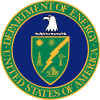
The United States Department of Energy (DOE) is a cabinet-level department of the United States Government concerned with the United States' policies regarding energy and safety in handling nuclear material. Its responsibilities include the nation's nuclear weapons program, nuclear reactor production for the United States Navy, energy conservation, energy-related research, radioactive waste disposal, and domestic energy production. It also directs research in genomics; the Human Genome Project originated in a DOE initiative. DOE sponsors more research in the physical sciences than any other U.S. federal agency, the majority of which is conducted through its system of National Laboratories. The agency is led by the United States Secretary of Energy, and its headquarters are located in Southwest Washington, D.C., on Independence Avenue in the James V. Forrestal Building, named for James Forrestal, as well as in Germantown, Maryland.
The politicization of science is the manipulation of science for political gain. It occurs when government, business, or advocacy groups use legal or economic pressure to influence the findings of scientific research or the way it is disseminated, reported or interpreted. The politicization of science may also negatively affect academic and scientific freedom, and as a result it is considered taboo to mix politics with science. Historically, groups have conducted various campaigns to promote their interests in defiance of scientific consensus, and in an effort to manipulate public policy.
The National Nanotechnology Initiative (NNI) is a research and development initiative which provides a framework to coordinate nanoscale research and resources among United States federal government agencies and departments.
The Small Business Innovation Research program is a United States Government program, coordinated by the Small Business Administration, intended to help certain small businesses conduct research and development (R&D). Funding takes the form of contracts or grants. The recipient projects must have the potential for commercialization and must meet specific U.S. government R&D needs.

The Global Change Research Act 1990 is a United States law requiring research into global warming and related issues. It requires a report to Congress every four years on the environmental, economic, health and safety consequences of climate change.

Cornelius Francis "Neal" Lane, is a U.S. physicist and Senior Fellow in Science and Technology Policy at Rice University's Baker Institute for Public Policy and Malcolm Gillis University Professor Emeritus of Physics and Astronomy Emeritus at Rice University in Houston, Texas.

The Department of Science and Technology, is the executive department of the Philippine government responsible for the coordination of science and technology-related projects in the Philippines and to formulate policies and projects in the fields of science and technology in support of national development.
The Climate Change Science Program (CCSP) was the program responsible for coordinating and integrating research on global warming by U.S. government agencies from February 2002 to June 2009. Toward the end of that period, CCSP issued 21 separate climate assessment reports that addressed climate observations, changes in the atmosphere, expected climate change, impacts and adaptation, and risk management issues. Shortly after President Obama took office, the program's name was changed to U.S. Global Change Research Program (USGCRP) which was also the program's name before 2002. Nevertheless, the Obama Administration generally embraced the CCSP products as sound science providing a basis for climate policy. Because those reports were mostly issued after the Fourth Assessment Report of the Intergovernmental Panel on Climate Change (IPCC), and in some cases focused specifically on the United States, they were generally viewed within the United States as having an importance and scientific credibility comparable to the IPCC assessments for the first few years of the Obama Administration.

The President's Council of Advisors on Science and Technology (PCAST) is a council, chartered in each administration with a broad mandate to advise the President of the United States on science and technology. The current PCAST was established by Executive Order 13226 on September 30, 2001, by President George W. Bush, was re-chartered by President Obama's April 21, 2010, Executive Order 13539, and was most recently re-chartered by President Trump's October 22, 2019, Executive Order 13895.
The United States produced 6.6 billion metric tons of carbon dioxide equivalent greenhouse gas (GHG) emissions in 2019, the second largest in the world after greenhouse gas emissions by China and among the countries with the highest greenhouse gas emissions per person. In 2019 China is estimated to have emitted 27% of world GhG, followed by the USA with 11%, then India with 6.6%. In total the USA has emitted 400 billion metric tons, more than any other country. This is over 15 tonnes per person and, amongst the top ten emitters, is the second highest country by greenhouse gas emissions per person after Canada. Because coal-fired power stations are gradually shutting down, in the 2010s emissions from electricity generation fell to second place behind transportation which is now the largest single source. In the year 2018, 28% of the GHG emissions of the United States were from transportation, 27% from electricity, 22% from industry, 12% from commercial and residential buildings and 10% from agriculture.

The National Science and Technology Council (NSTC) is a council in the Executive Branch of the United States. It is designed to coordinate science and technology policy across the branches of federal government.
Green jobs or green-collared jobs are, according to the United Nations Environment Program, "work in agricultural, manufacturing, research and development (R&D), administrative, and service activities that contribute(s) substantially to preserving or restoring environmental quality. Specifically, but not exclusively, this includes jobs that help to protect ecosystems and biodiversity; reduce energy, materials, and water consumption through high efficiency strategies; de-carbonize the economy; and minimize or altogether avoid generation of all forms of waste and pollution." The environmental sector has the dual benefit of mitigating environmental challenges as well as helping economic growth.
The Joint Ocean Commission Initiative is a bipartisan, collaborative group in the United States that aims to "accelerate the pace of change that results in meaningful ocean policy reform." The Joint Initiative was established by the members of two major U.S.-based oceans commissions: the Pew Oceans Commission and the United States Commission on Ocean Policy. It was originally co-chaired by former White House Chief of Staff Leon Panetta and former Chief of Naval Operations Admiral James D. Watkins, chairs of the Pew and U.S. Ocean Commissions, respectively. Currently, the Joint Initiative is led by a Leadership Council, which is co-chaired by Christine Todd Whitman, former EPA Administrator under President George W. Bush and former governor of New Jersey, and Norman Y. Mineta, Secretary of Commerce under President Bill Clinton and Secretary of Transportation under President George W. Bush.

The climate change policy of the United States has major impacts on global climate change and on global climate change mitigation. This is because the United States is the second largest emitter of greenhouse gasses in the world after China, and is among the countries with the highest greenhouse gas emissions per person in the world. In total the United States has emitted over 400 billion metric tons of greenhouse gasses, more than any country in the world.

The Arctic policy of the United States is the foreign policy of the United States in regard to the Arctic region. In addition, the United States' domestic policy toward Alaska is part of its Arctic policy.

The science policy of the United States is the responsibility of many organizations throughout the federal government. Much of the large-scale policy is made through the legislative budget process of enacting the yearly federal budget, although there are other legislative issues that directly involve science, such as energy policy, climate change, and stem cell research. Further decisions are made by the various federal agencies which spend the funds allocated by Congress, either on in-house research or by granting funds to outside organizations and researchers.

The Networking and Information Technology Research and Development (NITRD) program consists of a group of U.S. federal agencies to research and develop information technology (IT) capabilities to empower Federal missions; support U.S. science, engineering, and technology leadership; and bolster U.S. economic competitiveness.

Robert K. Dixon is an energy, environment, and economic expert at the Office of International Affairs, US Department of Energy headquarters in Washington, DC, USA.












